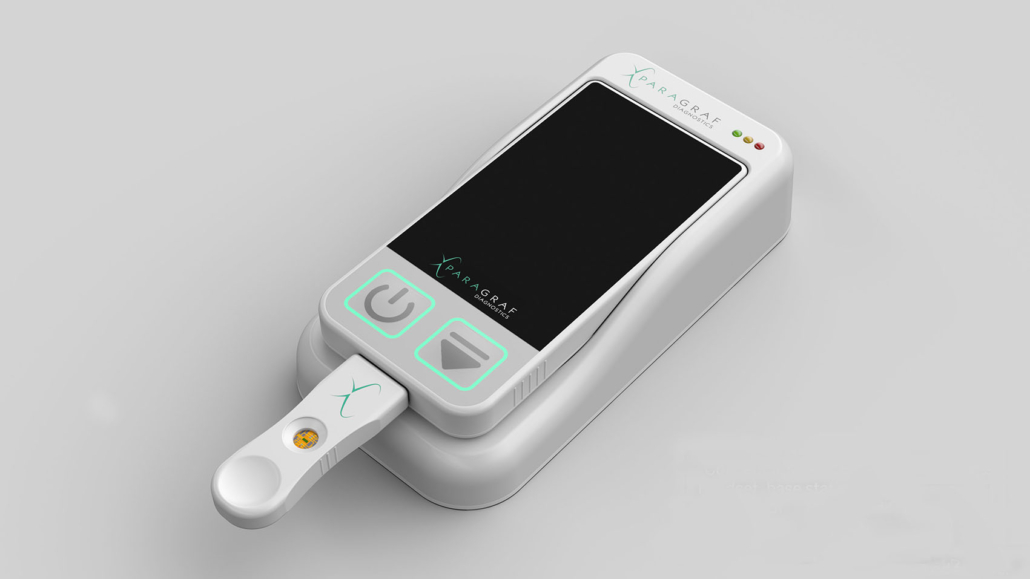New photoacoustic endoscope fits inside a needle
Tiny imaging device lays groundwork for high-resolution 3D imaging during clinical procedures
Tiny imaging device lays groundwork for high-resolution 3D imaging during clinical procedures
Women are the cornerstone of families, communities and economies and deserve the highest quality of care when breast cancer is detected. Hologic, a global champion of women’s health, is driven to improve women’s breast health journey through its innovative, integrated medical technology, which it calls the Breast Health Continuum of Care. This focuses on delivering […]
As medical device manufacturer Owen Mumford celebrates its 70th birthday this year. Jesper Jonsson, Director of Medical Devices, reflects on the family-owned company’s achievements so far, and its ambitions for the decades to come.
Siemens Healthineers pioneers breakthroughs in healthcare. For everyone. Everywhere. By constantly bringing breakthrough innovations to market, it enables healthcare professionals to deliver high-quality care, leading to the best possible outcome for patients. The portfolio, spanning from in-vitro and in-vivo diagnostics to image-guided therapy and innovative cancer care, is crucial for clinical decision-making and treatment pathways.
A comprehensive assessment of scientific literature has uncovered empirical evidence that more than 58% of human diseases caused by pathogens, such as dengue, hepatitis, pneumonia, malaria, Zika and more, have been – at some point – aggravated by the hazards of climate change. That alarming finding is the result of a research paper published on August 8 in Nature Climate Change by a team of researchers from the University of Hawaiʻi at Mānoa.
The researchers carried out a systemic search for empirical examples about the impacts of 10 climatic hazards sensitive to greenhouse gas (GHG) emissions on each known human pathogenic disease. These hazards included warming, drought, heatwaves, wildfires, extreme precipitation, floods, storms, sea level rise, ocean biogeochemical change, and land cover change.
Combining two authoritative lists of all known infections and pathogenic diseases that have affected humanity in recorded history, researchers then reviewed more than 70,000 scientific papers for empirical examples about each possible combination of a climatic hazard impacting each of the known diseases.
The research revealed that warming, precipitation, floods, drought, storm, land cover change, ocean climate change, fires, heatwaves and sea level changes were all found to influence diseases triggered by viruses, bacteria, animals, fungi, protozoans, plants and chromists. Pathogenic diseases were primarily transmitted by vectors, although case examples were also found for waterborne, airborne, direct contact and foodborne transmission pathways.
Ultimately, the research found that more than 58% (218 out of 375) of known human pathogenic diseases had been affected at some point, by at least one climatic hazard, via 1,006 unique pathways.
“Given the extensive and pervasive consequences of the COVID 19 pandemic, it was truly scary to discover the massive health vulnerability resulting as a consequence of greenhouse gas emissions,” said Camilo Mora, geography professor in the College of Social Sciences (CSS) and lead author of the study. “There are just too many diseases, and pathways of transmission, for us to think that we can truly adapt to climate change. It highlights the urgent need to reduce greenhouse gas emissions globally.”
An interactive web-page showing each connection between a climatic hazard and a disease case was developed by the research team. The tool allows users to query specific hazards, pathways and disease groups, and see the available evidence.
Researchers also found that, while the great majority of diseases were aggravated by climatic hazards, 63 out of 286 diseases diseases were diminished by some climatic hazards, although 54 of them were at times also aggravated by other climatic hazards; only nine pathogenic diseases were exclusively diminished by climatic hazards. Warming, for example, appears to have reduced the spread of viral diseases probably related to unsuitable conditions for the virus or because of a stronger immune system in warmer conditions.
“We knew that climate change can affect human pathogenic diseases,” said co-author Kira Webster, CSS geography PhD student. “Yet, as our database grew, we became both fascinated and distressed by the overwhelming number of available case studies that already show how vulnerable we are becoming to our ongoing growing emissions of greenhouse gases.”
A Phase I/II multi-centre clinical trial, called B-AMAZE, has found that a single gene therapy injection dramatically reduces the bleeding risk faced by people living with haemophilia B and enabled trial participants to stop their regular blood clotting factor replacement therapy.
The study is published in the July 21, 2022 issue of the New England Journal of Medicine.
Of the 10 male patients selected to take part in the trial, all showed dose-dependent increases in factor IX levels. At a median follow-up of 27.2 months, sustained factor IX activity was observed in all the patients except one.
Haemophilia B is a rare and inherited genetic bleeding disorder caused by low levels of the blood clotting factor IX (FIX) protein.
The gene responsible for making FIX protein is located on the X chromosome, so the severe form of haemophilia B is much more common in men.
Currently, patients with haemophilia B need to inject themselves regularly – usually weekly – with recombinant FIX, a regular replacement therapy to prevent excessive bleeding. Despite advances in treatment, patients may continue to see debilitating joint damage.
The B-AMAZE trial and the related long-term follow up study found that one-time treatment with FLT180a led to sustained production of FIX protein from the liver in nine of ten patients, across four different dose levels. They no longer required weekly injections of FIX protein. They are also all enrolled in the long-term follow up study to assess safety and durability of FIX expression for 15 years.
FLT180a (verbrinacogene setparvovec) is a liver-directed adeno-associated virus (AAV) gene therapy. AAV gene therapy works by using a packaging from the proteins found in the outer membrane of the virus, to deliver a functional copy of a gene directly to patient tissues – in this case the liver. Newly synthesised proteins – in this case the FIX protein – are released into the blood. A one-time infusion can achieve long-lasting effects.
Lead author Professor Pratima Chowdary of the Royal Free Hospital, UCL Cancer Institute, said: “Removing the need for haemophilia patients to regularly inject themselves with the missing protein is an important step in improving their quality of life. The long term follow up study will monitor the patients for durability of expression and surveillance for late effects.”
Patients in the trial needed to take immune suppressing drugs over several weeks to several months, to prevent their immune systems from rejecting the therapy, and all reported known side effects. While the treatment was generally well tolerated, all patients experienced some form of adverse events, with an abnormal blood clot in one who received the highest FLT180a dose and had the highest levels of FIX protein.
Freeline Therapeutics co-founder Professor Amit Nathwani (UCL Medical Sciences), who co-authored the study, said: “Gene therapy is still a young field that pushes the boundaries of science for people with severe genetic diseases.
“The B-AMAZE long-term data add to the growing body of evidence that gene therapy has the potential to free patients from the challenges of having to adhere to lifelong therapy or could provide treatment where none exists today.”
Pamela Foulds, MD, Chief Medical Officer of Freeline, said: “The B-AMAZE long-term data continue to support our confidence that a single dose of FLT180a could protect people with haemophilia B from bleeding and the need for lifelong FIX replacement through durable expression of FIX at protective levels.”
The Phase I/II trial was sponsored by University College London and funded by Freeline Therapeutics, a clinical-stage biotechnology company developing AAV vector-mediated systemic gene therapies.
A Phase I/II dose-confirmation trial of FLT180a called B-LIEVE to finalize a dose for a Phase 3 pivotal trial is in progress.

Concept image of Paragraf diagnostic handset and test cartridge — © Paragraph 2022
Cambridgeshire, UK-based Paragraf, the first company in the world to deliver a scalable approach to graphene electronic device manufacturing, has announced a plan to develop a new generation of graphene-based, in-vitro diagnostic products that will give results within a few minutes.
With the support of a £550,000 Biomedical Catalyst grant award from Innovate UK, Paragraf initiated a two-year programme to develop a proof-of-concept combined PCT (procalcitonin) and CRP (C-reactive protein) test, on a single panel. On March 1 this year Paragraf raised US$60 million in a Series B financing round.
The company is collaborating with the universities of Liverpool, Manchester and Newcastle, Newcastle upon Tyne Hospitals NHS Foundation Trust and Manchester University NHS Foundation Trust (MFT), on the development.
A clinical study of the combined PCT/CRP test will be delivered at MFT’s Diagnostics and Technology Accelerator (DiTA) in mid-2023. DiTA aims to address unmet needs, transform patient care and improve efficiency within the NHS, by facilitating the rapid translation and adoption of new innovations into the healthcare system. The project is expected to be completed by the end of May 2024.
Paul Dark, Professor of Critical Care Medicine at The University of Manchester, and Honorary NHS Consultant at Salford Royal, part of Northern Care Alliance NHS Foundation Trust, said: “We expect to show that our proposed acute inflammatory marker test will have the capability to deliver accurate results for emergency patient care within a few minutes, from a small sample of blood. The accuracy of the test is envisaged to be at least comparable with hospital centralised lab-based immunoassay tests which can take hours to provide results back to emergency services.”
Prof. Dark also leads the National Institute for Health and Care Research (NIHR) Manchester Biomedical Research Centre (BRC), Respiratory Non-fungal Infections Programme, which is focused on providing more accurate, rapid diagnosis for patients with severe respiratory infections.

Malcolm Stewart, Paragraf Diagnostics Business Development Director
Malcolm Stewart, Paragraf Diagnostics Business Development Director, said: “This graphene-based diagnostic test is expected to become the first test in the world to give clinicians the ability to identify patients who need an antibiotic treatment within the space of a regular 15-minute clinic appointment. It encourages antimicrobial stewardship by giving clinicians the insight into when not to prescribe antibiotics as the test result differentiates viral from bacterial infections.”
Commenting on the role of graphene in the test, Stewart explained that graphene enhances the test by having the ability to detect very low levels of the target protein (in this case). “Graphene is one of the most conductive substances ever discovered. The almost immediate electrical conductivity change in the graphene when only picogram levels of the target (in this case PCT) are detected is the difference the graphene makes. Simply put, graphene allows us to detect much lower concentrations of target analytes and in single digit minutes than is conventionally possible – and in a piece of equipment that will be handheld in size.
“We can make the graphene into chip-like devices – called graphene field effect transistors (GFETS) – which allow us to detect multiple analytes on one chip, a technique called multiplexing. This first test we are working on will detect two analytes on one chip – PCT and CRP. In future, tests we will be multiplexing more than six analytes on one chip in the cartridge.
“Graphene is also biocompatible meaning that we can deposit samples without having to pre-prepare them. So in this case, for the PCT/CRP test, we will only require a couple of drops of blood directly into the test cartridge. The reduction in pre-analytical errors is vital for tests like this one being used in critical care areas where time to result is important. Once this test is being used in primary care the lack of pre-preparation of the sample makes the test feasible in a GP surgery or even in a patient’s home,” Stewart explained.
Enitan Carrol, Professor of Paediatric Infectious Diseases at the University of Liverpool, reiterated this point: “This technology reduces the time and complexity of sample preparation which, together with its rapid measurement speed, provides clinicians with accurate results in a timeframe that allows immediate decisions to be made on antimicrobial prescribing. This is especially important for the treatment of children and neonates.”

Paragraf
Explaining the manufacturing process, Stewart said: “As we scale up our business, the graphene will be deposited on to larger wafers – 20 or 30cm diameter – in the future. We then make GFETS from the wafers.
“Our process is called MOCVD (metal oxide chemical vapour deposition) and is not unique to us. But the way we do it and the ingredients we use makes it unique. We can make graphene that is contamination free, because or graphene is directly formed on the wafer rather than transferred from another metal like copper in other graphene manufacturing processes.
“We believe we have a technique that is scalable to millions of chips a year when we are manufacturing our chips on 30cm wafers.”
Paragraf plans to deliver a series of high sensitivity, rapid tests for disease biomarkers in areas including cardiovascular disease, oncology, and infectious diseases.
The ambition is to develop a comprehensive suite of tests that could be used in almost any environment or healthcare setting. The tests are designed to provide ultra-fast answers to diagnostic challenges and to create a complete diagnostic toolkit at the point of care.
As of 26 May 2022, new rules on in vitro diagnostic medical devices (IVDR) such as HIV tests, pregnancy tests or COVID-19 tests, are applicable across the European Union. The rules will better protect public health and patient safety in respect to these devices, bringing EU law in line with technological advances and progress in […]
Current guidelines used to plan salvage radiation treatments in patients with local recurrence of prostate cancer should be updated to take into consideration information derived from novel imaging modalities, such as PSMA PET, according to research presented at the Society of Nuclear Medicine and Molecular Imaging 2022 Annual Meeting. The study showed that PSMA PET […]
A targeted radionuclide alpha therapy, 225Ac-DOTATATE, has been shown to have long-term anti-tumour effects in patients with advanced-stage gastroenteropancreatic neuroendocrine tumours (GEP-NETs). Results from the Phase II study showed promising survival rates, high response rates and an acceptable toxicity profile, making 225Ac-DOTATATE a potential treatment option for patients who have exhausted other forms of therapy. […]
April 2024
The medical devices information portal connecting healthcare professionals to global vendors
Prins Hendrikstraat 1
5611HH Eindhoven
The Netherlands
info@interhospi.com
PanGlobal Media IS not responsible for any error or omission that might occur in the electronic display of product or company data.
This site uses cookies. By continuing to browse the site, you are agreeing to our use of cookies.
Accept settingsHide notification onlyCookie settingsWe may ask you to place cookies on your device. We use cookies to let us know when you visit our websites, how you interact with us, to enrich your user experience and to customise your relationship with our website.
Click on the different sections for more information. You can also change some of your preferences. Please note that blocking some types of cookies may affect your experience on our websites and the services we can provide.
These cookies are strictly necessary to provide you with services available through our website and to use some of its features.
Because these cookies are strictly necessary to provide the website, refusing them will affect the functioning of our site. You can always block or delete cookies by changing your browser settings and block all cookies on this website forcibly. But this will always ask you to accept/refuse cookies when you visit our site again.
We fully respect if you want to refuse cookies, but to avoid asking you each time again to kindly allow us to store a cookie for that purpose. You are always free to unsubscribe or other cookies to get a better experience. If you refuse cookies, we will delete all cookies set in our domain.
We provide you with a list of cookies stored on your computer in our domain, so that you can check what we have stored. For security reasons, we cannot display or modify cookies from other domains. You can check these in your browser's security settings.
.These cookies collect information that is used in aggregate form to help us understand how our website is used or how effective our marketing campaigns are, or to help us customise our website and application for you to improve your experience.
If you do not want us to track your visit to our site, you can disable this in your browser here:
.
We also use various external services such as Google Webfonts, Google Maps and external video providers. Since these providers may collect personal data such as your IP address, you can block them here. Please note that this may significantly reduce the functionality and appearance of our site. Changes will only be effective once you reload the page
Google Webfont Settings:
Google Maps Settings:
Google reCaptcha settings:
Vimeo and Youtube videos embedding:
.U kunt meer lezen over onze cookies en privacy-instellingen op onze Privacybeleid-pagina.
Privacy policy